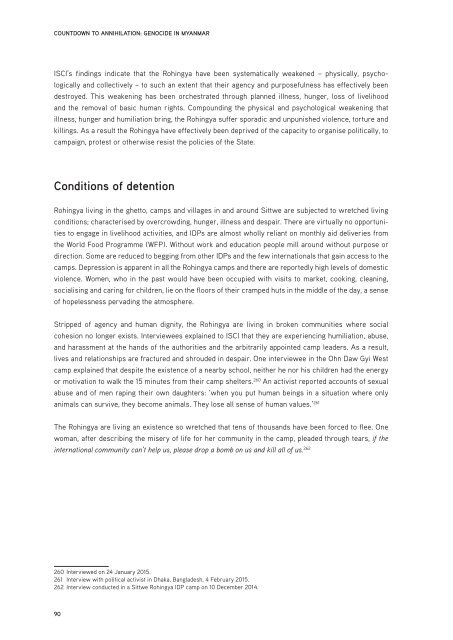Create successful ePaper yourself
Turn your PDF publications into a flip-book with our unique Google optimized e-Paper software.
COUNTDOWN TO ANNIHILATION: <strong>GENOCIDE</strong> <strong>IN</strong> <strong>MYANMAR</strong><br />
ISCI’s findings indicate that the Rohingya have been systematically weakened – physically, psychologically<br />
and collectively – to such an extent that their agency and purposefulness has effectively been<br />
destroyed. This weakening has been orchestrated through planned illness, hunger, loss of livelihood<br />
and the removal of basic human rights. Compounding the physical and psychological weakening that<br />
illness, hunger and humiliation bring, the Rohingya suffer sporadic and unpunished violence, torture and<br />
killings. As a result the Rohingya have effectively been deprived of the capacity to organise politically, to<br />
campaign, protest or otherwise resist the policies of the State.<br />
Conditions of detention<br />
Rohingya living in the ghetto, camps and villages in and around Sittwe are subjected to wretched living<br />
conditions; characterised by overcrowding, hunger, illness and despair. There are virtually no opportunities<br />
to engage in livelihood activities, and IDPs are almost wholly reliant on monthly aid deliveries from<br />
the World Food Programme (WFP). Without work and education people mill around without purpose or<br />
direction. Some are reduced to begging from other IDPs and the few internationals that gain access to the<br />
camps. Depression is apparent in all the Rohingya camps and there are reportedly high levels of domestic<br />
violence. Women, who in the past would have been occupied with visits to market, cooking, cleaning,<br />
socialising and caring for children, lie on the floors of their cramped huts in the middle of the day, a sense<br />
of hopelessness pervading the atmosphere.<br />
Stripped of agency and human dignity, the Rohingya are living in broken communities where social<br />
cohesion no longer exists. Interviewees explained to ISCI that they are experiencing humiliation, abuse,<br />
and harassment at the hands of the authorities and the arbitrarily appointed camp leaders. As a result,<br />
lives and relationships are fractured and shrouded in despair. One interviewee in the Ohn Daw Gyi West<br />
camp explained that despite the existence of a nearby school, neither he nor his children had the energy<br />
or motivation to walk the 15 minutes from their camp shelters. 260 An activist reported accounts of sexual<br />
abuse and of men raping their own daughters: ‘when you put human beings in a situation where only<br />
animals can survive, they become animals. They lose all sense of human values.’ 261<br />
The Rohingya are living an existence so wretched that tens of thousands have been forced to flee. One<br />
woman, after describing the misery of life for her community in the camp, pleaded through tears, if the<br />
international community can’t help us, please drop a bomb on us and kill all of us. 262<br />
260 Interviewed on 24 January 2015.<br />
261 Interview with political activist in Dhaka, Bangladesh, 4 February 2015.<br />
262 Interview conducted in a Sittwe Rohingya IDP camp on 10 December 2014.<br />
90



